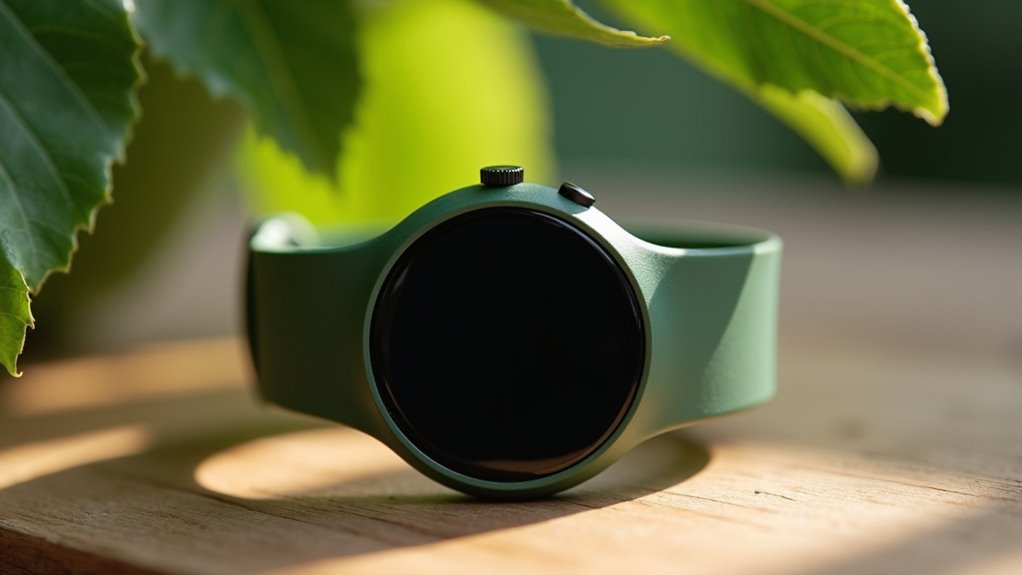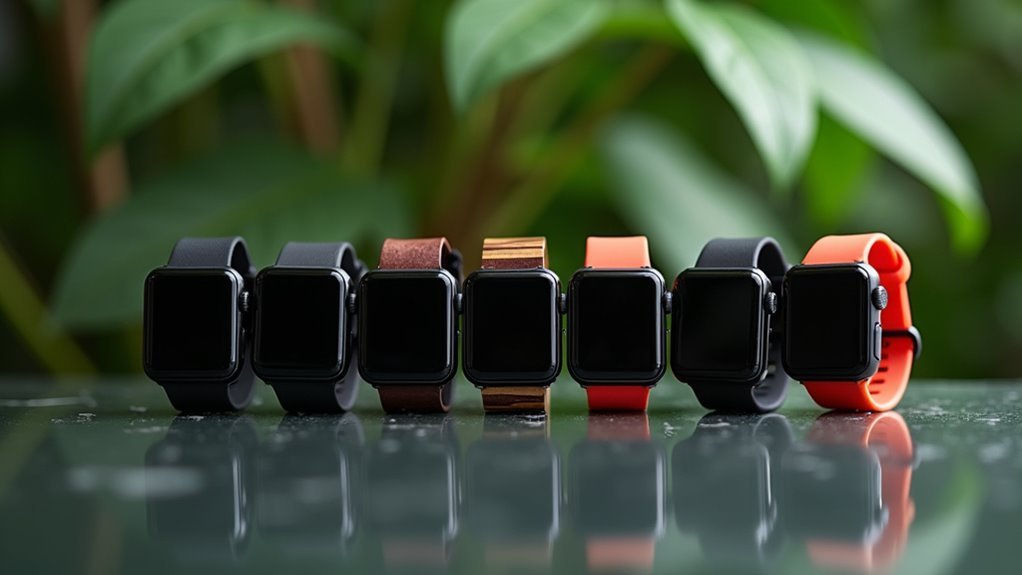You’re seeing smartwatch manufacturers embrace seven key green design trends that blend style with sustainability. Recycled steel and plastics now comprise 40-60% of watch construction, while biodegradable plant-based straps from pineapple leaves and cork replace traditional leather. Solar-powered charging harnesses natural light to reduce battery waste, and AI features guide you toward eco-friendly habits. Smaller dial designs minimize material usage, conflict-free sourcing guarantees ethical manufacturing, and energy-efficient chips extend battery life. These innovations reveal how technology can protect our planet.
Recycled Metals and Plastics Transform Watch Construction

Revolution sweeps through smartwatch manufacturing as companies embrace recycled metals and plastics to reshape how we build wearable technology.
You’re witnessing a fundamental shift where recycled steel now comprises 40% to 60% of many watches, with some manufacturers like ID Genève achieving 100% recycled steel in their models. This transformation addresses quality concerns while maximizing sustainability—most recycled steel reaches 98% purity levels.
You’ll find smartwatch bands crafted from recycled yarns and eco-friendly plastics, while companies like Apple incorporate 100% recycled materials in copper components and battery cobalt.
These advances in recycling technology make metal waste processing more efficient for watch production. Major steel suppliers are transitioning to electric arc furnaces that dramatically reduce energy consumption during the recycling process.
You’re supporting a circular economy that reduces raw material extraction, minimizes e-waste, and balances economic growth with environmental responsibility through innovative sustainable practices.
Biodegradable Plant-Based Straps Replace Traditional Materials
You’ll find that plant-based straps crafted from pineapple leaves, cork, and coconut fibers offer remarkable benefits beyond just avoiding animal products.
These materials don’t just match traditional leather’s performance—they’re actually reducing your environmental footprint while delivering impressive durability and water resistance.
You’re getting straps that perform as well as conventional options while supporting sustainable production practices that minimize carbon emissions and waste. Leading manufacturers like ColaReb are producing cruelty-free alternatives in Italy using sailcloth, nylon, and other eco-friendly materials that completely eliminate PVC from their construction.
Plant Material Benefits
As consumers increasingly prioritize sustainability in their tech accessories, plant-based smartwatch straps are emerging as compelling alternatives to traditional leather and synthetic materials.
You’ll discover that pineapple leather, cork, and Bananatex offer exceptional comfort while maintaining the familiar feel of traditional materials. These plant-based options provide natural waterproof properties and surprising durability that rivals conventional straps.
You’re contributing to environmental protection since these materials come from renewable resources like pineapple leaves and abaca banana plants. The production processes use minimal water and avoid harmful pesticides, reducing your carbon footprint.
Additionally, you’ll enjoy incredible design flexibility with various colors, patterns, and textures available. Many options are PETA-approved and biodegradable, ensuring your style choices align with your values while supporting sustainable manufacturing practices. Advanced materials like apple fibers from Tyrol, Italy are also being incorporated into luxury smartwatch designs, demonstrating the growing sophistication of plant-based alternatives.
Environmental Impact Reduction
While traditional smartwatch straps contribute to environmental degradation through harmful extraction processes and persistent waste, biodegradable plant-based alternatives offer a transformative solution that dramatically reduces your ecological footprint.
You’ll eliminate toxic PFAS contamination while supporting circular economy principles through natural degradation. Plant-based manufacturing uses less water and energy than synthetic production, utilizing agricultural by-products to minimize fossil fuel dependence.
| Impact Category | Traditional Straps | Plant-Based Straps |
|---|---|---|
| Waste Management | Landfill accumulation | Natural decomposition |
| Chemical Exposure | PFAS contamination | Chemical-free materials |
| Carbon Footprint | High fossil fuel use | Renewable resource base |
| End-of-Life | Persistent pollution | Compostable disposal |
You’re choosing materials that break down naturally, preventing long-term environmental contamination while supporting sustainable agriculture practices that enhance soil health and biodiversity. These eco-friendly bands support ethical manufacturing practices that prioritize worker welfare and environmental stewardship throughout the production process.
Durability and Performance
Beyond environmental benefits, plant-based smartwatch straps deliver exceptional durability that matches or exceeds traditional synthetic materials.
Flaxstic bioplastic provides robust mechanical strength suitable for daily wear and active lifestyles, while bio rubber maintains comparable toughness and elasticity to conventional rubber. You’ll find organic hemp straps resist tearing and stretching while remaining lightweight and breathable.
These materials actually outperform many synthetics in key areas. Plant-based straps resist UV degradation and sweat damage better than traditional alternatives, extending their lifespan considerably.
Natural fibers improve moisture wicking and breathability, reducing skin irritation during extended wear. When manufacturers combine natural fibers with synthetic reinforcements, they enhance overall wear resistance without compromising biodegradability.
You’re getting superior performance while supporting circular product lifecycles that decompose naturally at end-of-life. Modern eco-friendly watch bands feature quick-release metal clasps that make switching between different sustainable straps effortless for daily coordination.
Solar-Powered Charging Reduces Environmental Impact
Solar-powered charging technology transforms how smartwatches consume energy by harnessing light from both natural sunlight and artificial sources like fluorescent lamps.
You’ll reduce your reliance on traditional charging methods while minimizing electronic waste through fewer battery replacements. This sustainable approach conserves resources and lowers your carbon footprint considerably.
Modern solar panels efficiently capture various light sources, powering demanding functions like GPS tracking and heart rate monitoring. Power-saving function automatically activates when your watch is in dark locations after periods of inactivity, further extending battery life.
You’ll find these eco-friendly alternatives particularly valuable during outdoor activities where traditional power sources aren’t available. Solar technology maximizes energy absorption, providing reliable power for extended periods.
AI-Driven Features Promote Sustainable Daily Habits

As artificial intelligence transforms smartwatch technology, you’ll discover how these intelligent devices actively guide you toward more sustainable lifestyle choices.
AI-powered health monitoring continuously tracks your essential signs, providing personalized recommendations that help you maintain healthier habits while reducing healthcare-related environmental impacts. Your smartwatch’s AI optimizes energy efficiency through smart battery management and dynamic power settings, extending device lifespan and minimizing electronic waste.
AI-enhanced smartwatches deliver personalized health insights while extending device longevity through intelligent power optimization, reducing both healthcare and electronic waste impacts.
Advanced AI features enable seamless IoT integration, allowing you to control smart home devices for energy-efficient living. Modern smartwatches incorporate recycled ocean plastics and plant-based materials in their construction, demonstrating the industry’s commitment to environmental responsibility.
Automated nutrition tracking through image analysis eliminates manual logging while promoting sustainable eating patterns. Self-learning sensors adapt to recognize various activities, encouraging eco-friendly transportation choices like walking or cycling.
These intelligent capabilities transform your daily routines into environmentally conscious decisions.
Smaller Dial Designs Minimize Material Usage
Compact smartwatch designs represent one of the most direct approaches to reducing environmental impact in wearable technology. When you choose smaller dial designs, you’re supporting significant material reduction that cuts environmental impact during extraction and manufacturing.
These streamlined cases require fewer raw materials, reducing mining-related contamination while generating less production waste.
You’ll find that compact designs also deliver substantial energy savings. Smaller dials need fewer components and simpler assembly processes, which decreases manufacturing energy consumption by up to 86% of the device’s lifecycle emissions.
The reduced complexity often improves repairability, extending your device’s lifespan. Manufacturers can implement modular designs alongside smaller form factors to further extend device longevity and reduce electronic waste.
Additionally, smaller smartwatches enhance recycling potential through simplified disassembly and material recovery.
Market trends show you’re increasingly demanding sleek, minimalist designs that balance style with sustainability, making eco-friendly choices more mainstream.
Conflict-Free Sourcing Ensures Ethical Manufacturing

You’ll find that conflict-free sourcing has become essential for smartwatch manufacturers committed to ethical production practices.
When you choose devices with certified conflict-free components, you’re supporting brands that maintain transparent supply chains and trace materials from mine to finished product.
This approach guarantees you’re not inadvertently funding armed conflicts while encouraging manufacturers to adopt responsible material sourcing standards throughout their operations. Leading companies now source gold exclusively from certified industrial mines in select countries like the US, Canada, and Australia to ensure complete traceability and ethical compliance.
Responsible Material Sourcing Standards
While traditional manufacturing often overlooks the origins of raw materials, responsible material sourcing standards now require thorough verification that every component in your smartwatch comes from ethical sources.
You’ll find that suppliers must implement environmental management systems like ISO 14001 to reduce resource consumption and environmental impact. Your device’s materials must comply with strict chemical regulations including REACH and RoHS to guarantee safety and limit hazardous substances.
Suppliers can’t source from converted or degraded forests after specific deadlines, protecting natural ecosystems. Additionally, you’re assured that any animal-derived materials in your watch straps come from sustainably managed sources with written confirmation, guaranteeing no unethical treatment occurs during procurement processes.
Modern manufacturers utilize AI technology to enhance data quality and transparency throughout their supply chains, ensuring complete traceability of materials from origin to final product.
Ethical Supply Chain Transparency
Beyond selecting responsibly sourced materials, smartwatch manufacturers must now implement thorough transparency systems that track every component’s journey from mine to assembly line. You’ll find that IoT technologies reduce supply chain disruptions by 20% while enhancing real-time operational oversight. This visibility helps detect unethical practices and increases customer satisfaction by 10% through verified ethical sourcing.
| Technology Solution | Impact | Benefit |
|---|---|---|
| IoT Integration | 15% cost reduction | Real-time monitoring |
| Blockchain Tracking | Enhanced transparency | Conflict-free verification |
| Predictive Analytics | Disruption prevention | Proactive compliance |
However, you must remain vigilant against counterfeit devices that compromise data privacy and supply chain integrity. Regular audits, certification programs like Fairmined, and stakeholder engagement guarantee your smartwatch meets ethical manufacturing standards while maintaining operational efficiency. Modern wearable technology enables capturing critical supply chain data through voice commands, eliminating the need for manual documentation during factory inspections.
Certified Conflict-Free Components
As smartwatch manufacturers face increasing scrutiny over their mineral sourcing practices, certified conflict-free components have become essential for maintaining ethical production standards.
You’ll find that the main conflict minerals—tin, tantalum, tungsten, and gold (3TG)—are heavily regulated in electronics manufacturing. The Conflict-Free Sourcing Initiative (CFSI) validates smelters and refiners through third-party audits, ensuring your smartwatch doesn’t finance armed conflicts. This landmark achievement in ethical sourcing was highlighted when CFSI successfully validated conflict-free smelters for all four conflict minerals simultaneously.
When choosing conflict-free smartwatches, you’re supporting:
- Comprehensive traceability from mine to manufacturer for authentic sourcing verification
- Public transparency through annual supplier reporting and documentation
- Regulatory compliance meeting international standards like the Dodd-Frank Act
- Brand accountability with manufacturers requiring conflict-free declarations from all suppliers
This ethical approach enhances your product’s credibility while promoting responsible manufacturing practices.
Energy-Efficient Chips Extend Battery Performance
Two major breakthroughs in smartwatch chip design are revolutionizing how long your device stays powered throughout the day.
Modern 64-bit processors now dominate 55% of the market, delivering superior memory management while consuming less energy than their predecessors. You’ll find cutting-edge 3-nanometer manufacturing processes that dramatically reduce chip size and power consumption.
Big.LITTLE architectures intelligently balance workloads between high-performance and low-power cores, ensuring your smartwatch runs efficiently during demanding tasks. Major companies like Qualcomm Incorporated are leading these innovations while forming strategic partnerships with smartwatch manufacturers.
Specialized engines like Always-on Display processors optimize screen power usage without draining your battery. These innovations extend typical battery life from 1-3 days to an impressive 14 days in high-end models, while supporting advanced features like continuous health monitoring, GPS tracking, and AI-powered applications.
Frequently Asked Questions
How Much More Expensive Are Eco-Friendly Smartwatches Compared to Traditional Models?
You’ll typically pay 15-30% more for eco-friendly smartwatches due to recycled materials, sustainable manufacturing, and environmental certifications. However, there’s limited clear price differentiation since most brands integrate eco-features into existing models.
Can Biodegradable Straps Withstand Water Exposure and Intense Physical Activities?
You’ll find biodegradable straps struggle with water resistance and intense activities. They’re less resilient to sweat, abrasion, and repetitive stress compared to traditional materials, making them unsuitable for high-impact sports currently.
Do Solar-Powered Smartwatches Work Effectively in Low-Light Indoor Environments?
You’ll find solar-powered smartwatches struggle in low-light indoor environments. They can’t charge effectively without adequate light exposure, so you’ll need USB charging when sunlight’s insufficient for proper power generation.
Are Recycled Materials in Smartwatches as Durable as New Materials?
You’ll find recycled materials like stainless steel and titanium perform just as durably as virgin metals in smartwatches. They maintain identical strength properties while you’re supporting sustainable manufacturing and reducing environmental impact.
Which Smartwatch Brands Currently Offer the Most Sustainable Design Options?
You’ll find Garmin leads with solar-powered models, while Withings offers sustainable hybrid designs. Frederique Constant combines luxury with eco-consciousness, and Amazfit focuses on affordable, durable options using sustainable materials.





Leave a Reply